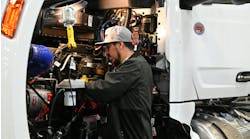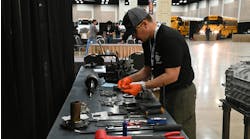It’s straightforward, a fact that anyone in the trucking industry knows well—trucks that aren’t moving and hauling cargo aren’t generating revenue. Idle trucks, in fact, are only generating costs.
For fleet maintenance managers, this maxim drives their main mission of keeping tractors and trailers on the road. In turn, they routinely employ tried-and-true practices, such as:
- Establishing effective inspection and preventive maintenance programs.
- Using advanced diagnostic tools to quickly identify the cause of vehicle issues.
- Following triage procedures that facilitate shop productivity.
- Training technicians to work on today’s highly advanced vehicles.
- Ensuring that timely maintenance is performed.
- Maintaining adequate parts supplies.
The drive to ensure and improve asset availability is increasingly leading to growth in both company-operated and outsourced mobile service operations. That’s because taking the shop to the tractor or trailer has inherent advantages. On-site service, for example, doesn’t require the time it takes to bring equipment to and from the shop. It’s also more easily managed around a fleet’s or an outside service provider customer’s schedule.
But on the road, in the yard or at a job site, mobile maintenance requires an ability to capture critical information about repair and parts needs. Today, devices like smartphones and tablets allow that to happen by giving mobile technicians access to maintenance management systems, no matter where the vehicle is located.
Expanding functionality to address new challenges
A central feature of these technology solutions is their ability to deliver the capabilities of shop management systems in a mobile environment. Included are vendor integrations. By extending information transfer to parts suppliers, for example, the ability to order the correct parts and facilitate more timely repairs leads to a reduction in downtime.
The value of connected mobile technology became rapidly apparent with the onset of the COVID-19 pandemic. As essential services, truck maintenance and repair operations were called upon to carry out their role while simultaneously finding new ways to function that provided for reduced exposure to the coronavirus for technicians, parts and management personnel, and drivers.
Part of meeting that challenge was to deploy mobile technology designed specifically to enable remote inspections, preventive maintenance, and repairs. Those tools are now proving valuable for maintenance operations by allowing fleet shops and service centers to keep trucks rolling, regardless of where assets are being serviced.
David Seewack is the founder and CEO of FinditParts. Seewack is focused on transforming how heavy-duty truck and trailer parts are bought and sold. Founded in 2010, FinditParts is the No. 1 supplier of these parts online, with more than 10 million available from more than 1,800 manufacturers and customers in over 210 countries.
This article originally appeared in FleetOwner.com.



